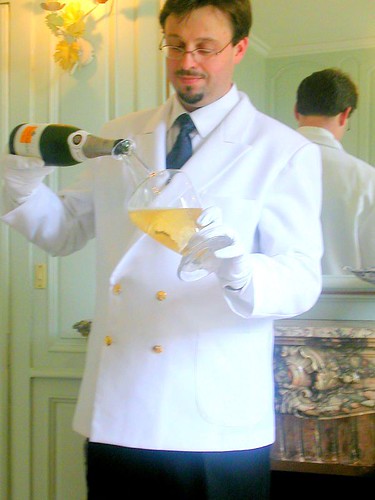Lunch at Veuve Clicquot. Click for more photos.
There's a brand new "Wine Notes" feature in the Saturday Wall Street Journal, by the paper's terrific wine-writing couple, Dot Gaiter and John Brecher (whose regular "Tastings" column continues to run on Fridays). It's a Q&A, but the WSJ team totally blows the very first question!
Reader from Idaho asks about decanting Champagne. Read the column (below), then look at the picture again: taken during lunch at Veuve Clicquot's vineyard guesthouse on the Montagne de Reims, in July, 2003. It's the Demi Sec, often decanted so that the bubbles don't overwhelm its lush flavors. Rich enough to be served with dessert, or foie gras, for that matter. Delectable!
Wine Notes
By DOROTHY J. GAITER and JOHN BRECHER
September 16, 2006; Page P9
In the years we have been writing our "Tastings" column, we have received thousands of questions about wine from readers. Each week, in this column, we will answer some questions that touch on common themes. We have edited the questions for space. If you have a question, drop us a note at wine@wsj.com. Be sure to include your full name, city and state.
Writing from Provence:
Last night at a good local restaurant here I ordered a bottle of white Côtes-du-Rhône. To my surprise, the waiter-sommelier proceeded to pour the wine into one of those broad, flat-based ship's decanters and swirl it around before pouring it. Then I saw it happening at another table, but this time the waiter poured the contents of his decanter into Champagne flutes. I strained to get a look at the bottle and recognized it as Ruinart Champagne. Is all this merely goofy affectation or is there something going on here that I should know about?
---- Lyman Drake, Ketchum, Idaho
We rarely decant (unless a wine is throwing a great deal of sediment) because we like to taste wines from beginning to end, as they open and change with time and air. But we know there are some people who feel that even some good whites can benefit from decanting, especially when they don't have time to linger over the wine for a long time. We had never heard of decanting Champagne, so we sent this note along to Ralph Hersom, the former wine director at New York's Le Cirque 2000, who now owns Ralph's Wines & Spirits in Rye, N.Y. He responded: "I have never seen nor heard of it. In sommelier school, we were always taught to 'preserve the bubbles' -- one reason why you should always attempt to open the bottle as softly as possible (no loud pop sending the cork flying!). It almost sounds as if this sommelier is the child of some former customers of mine who used to request swizzle sticks to get rid of the bubbles in the Champagne they were drinking. Imagine my amazement after they spent several hundred dollars on a fine vintage Champagne and would swirl and swirl until the bubbles were gone."

This is very interesting. Last night we opened a bottle of Champagne and part of my problem appreciating it was that the bubbles prevented my letting it just sit in my mouth. It never occurred to me to decant it. Maybe this is a good reason to open another bottle tonight and give it a try!
Ketchum, if you can!
Ronald,
Did you send this note to the WSJ columnists? They deserve enlightenment.